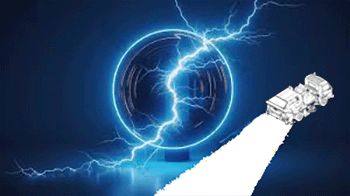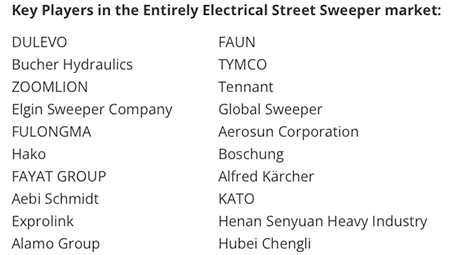Electric Sweepers Overview 2024

by Ranger Kidwell-Ross
posted September 2024
Electric-powered sweepers are starting to make inroads into the marketplace. Most are currently mechanical broom models, supposedly due to the extra power demands of the fan operation on vacuum and regenerative air sweepers.
Increasingly, states and cities are making commitments to move to electric (EV) fleets by a certain date in the future. As a result – and combined with government incentives toward the purchase of electric vehicles – EV sweepers are increasingly being specified. Here are five examples of jurisdictions that are doing so:
- Los Angeles, California: The city unveiled the nation's first all-electric street sweeper in 2023, developed through a collaboration between Battle Motors and Elgin Sweeper Company. This electric sweeper is being put into service as part of Los Angeles' commitment to transition to 100% clean energy by 2035.
- New York City: As part of its plan to have a completely electric fleet by 2040, New York City has already introduced its first electric street sweeper in May of 2021. The city operates a large and diverse fleet of over 30,000 vehicles, with 2,800 of them already being electric.
- Capitola, California: In December 2023, Capitola introduced the first electric street sweeper in Santa Cruz County. The R3Air electric street sweeper, manufactured by Global Environmental Products, is expected to save 90 tons of carbon emissions over its lifetime.
- Boston, Massachusetts: The city deployed its first Ravo electric street sweeper in 2022, with plans for a second one. These electric sweepers operate near the heart of Boston on preplanned routes.
Based on the search results found, electric street sweepers have been shown to offer several cost advantages compared to diesel models:
- Lower fuel costs: Electric sweepers have significantly lower fuel consumption compared to diesel models. One source mentions that hybrid electric sweepers can reduce fuel consumption by 52% compared to diesel-powered sweepers.
- Reduced maintenance costs: Electric sweepers have fewer moving parts, filters, hoses, and fluids, resulting in lower maintenance costs compared to diesel engines.
- Longer lifespan: Diesel engines typically run twice as long as gasoline engines before needing major service, but electric motors generally have even longer lifespans and require less maintenance.
- Operational efficiency: Electric sweepers can be programmed for more precise speed control, which is beneficial for consistent low-speed operation typical in street sweeping.
- Incentives and compliance: Electric sweepers may qualify for federal and state incentives, helping to offset their higher initial purchase cost. They also help municipalities comply with emissions regulations, potentially avoiding fines.
However, it's important to note that the initial purchase price of electric street sweepers is significantly higher than diesel models. For example, the Battle Motors/Elgin Electric Broom Bear costs over $800,000, which is double the price of a diesel street sweeper. Despite this higher upfront cost, the long-term operational savings from lower fuel and maintenance costs can make electric sweepers more cost-effective over their lifetime.
Additionally, as cities transition to cleaner energy sources, the total cost of ownership for electric sweepers is expected to become increasingly favorable compared to diesel models.
Here is information on the models currently in the U.S. marketplace. If you are aware of any makes/models we missed, please let us know.
Elgin Sweeper offers two electric street sweeper models:
100% Electric Broom Bear: This is Elgin's first fully electric street sweeper, featuring:
- Zero emissions
- 400 kWh battery capacity for extended shifts
- Tight turning radius for maneuverability
The Elgin company also offers plug-in hybrid electric Pelican and Broom Bear models that also help reduce carbon footprint.
Global Environmental offers two electric street sweeper models:
M3EV Electric is a compact 100% plug-in electric sweeper with:
- Top travel speed of 25 MPH
- Up to 11 MPH sweeping speed
M4EV Electric is a larger 100% plug-in electric sweeper with:
- Top highway speed of 55 MPH
- Up to 11 hours of operational time
In addition, Global's M3 and M4 models are offered as diesel/electric models.
RAVO, a brand of a worldwide leader, FAYAT, offers two all-electric sweepers. These are: The RAVO E2, which is a 100% electric bicycle lane sweeper. The E2 offers:
- 64 kWh battery with an advanced energy management system that optimizes battery usage, allowing the sweeper to cover more ground on a single charge.
- Autonomy – allowing the machine to finish a sweeping shift without worrying about recharging through the optimization of consumption and energy management.
The RAVO R5e, which offers:
- A Battery Management System that optimises the level of kW/h consumption to offer full shift autonomy.
- A battery warranty that is 8000 hours or 5 years.
- A sweeping width of 95" as standard with up to 130" width available.
Schwarze Industries' website indicates the company has introduced a prototype mechanical broom sweeper called the M6 Avalanche EV. The company touts that it is a:
- 100% electric mechanical broom sweeper
- Designed to reduce emissions and noise pollution
- Provides instant torque for efficient power delivery
Economica has researched something it titles "Entirely Electrical Street Sweeper Industry Future Trends Analysis." This is a study on the topic that the company appears to be attempting to sell for $4480 to a single user. The sweeper companies that Economica lists in its promo as being a component of the electric sweeper industry are the following:

If you have a question or comment about this article, please let us know. If appropriate, we'll add it to the bottom of this page.
|

